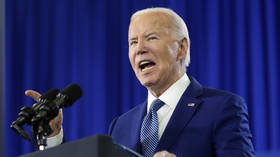‘TTIP has negative connotation’: Austria, France want new name for controversial talks
Austria and France have suggested to other European countries that the controversial TTIP free trade agreement between the US and the EU be restarted under a new name to avoid associations with “dealings of big corporations.”
At a meeting of EU trade ministers on Friday, Vienna and Paris pushed for an end to the protracted negotiations between the US and Europe on the Transatlantic Trade and Investment Partnership (TTIP).
Austrian Economy Minister Reinhold Mitterlehner said in an interview with Die Welt newspaper that he strongly supports a call by his French counterpart, Matthias Fekl, to re-think the talks and give them a fresh start under a new name.
‘#TTIP negotiations between EU and US have de facto failed’ – German economy minister https://t.co/maHHdSUcUk
— RT (@RT_com) 28 августа 2016 г.
“The talks on free trade [agreement] with the US should restart under a different name and with different substantive headings,” Mitterlehner said.
“TTIP has now become a metaphor for the exuberant dealings of big corporations, which is a negative connotation. We hope to have a good agreement, but it must be approached differently,” he argued.
The negotiations should resume after the US presidential elections, Mitterlehner added.
Washington is impressing on the EU its desire for the accords to be signed before the end of this year, but the move has encountered heavy resistance from a number of European countries, including Germany.
Opponents of TTIP argue that the controversial deal will put transnational corporations’ interests before those of European governments and peoples, also undermining Europe’s standards of labor and environmental protection.
Mitterlehner claimed that there is growing support for the Austrian-French proposal from other trade ministers in the EU, and “many colleagues are supporting us privately.”
Last week, tens of thousands of protesters took to the streets in Germany and Austria to protest TTIP.
Huge rallies took place in seven major German cities, attracting at least 100,000 protesters who gathered despite heavy rain. A demonstration in Vienna saw some 25,000 protesters attend, according to organizers.
In late August, German Vice Chancellor and Economy Minister Sigmar Gabriel, a Social Democrats’ heavyweight, said that the talks “have failed because we Europeans did not want to subject ourselves to American demands.”
The two sides have been unable to find common language on a single chapter of the deal, and have not come any closer to compromise throughout 14 rounds of talks, Gabriel said.












